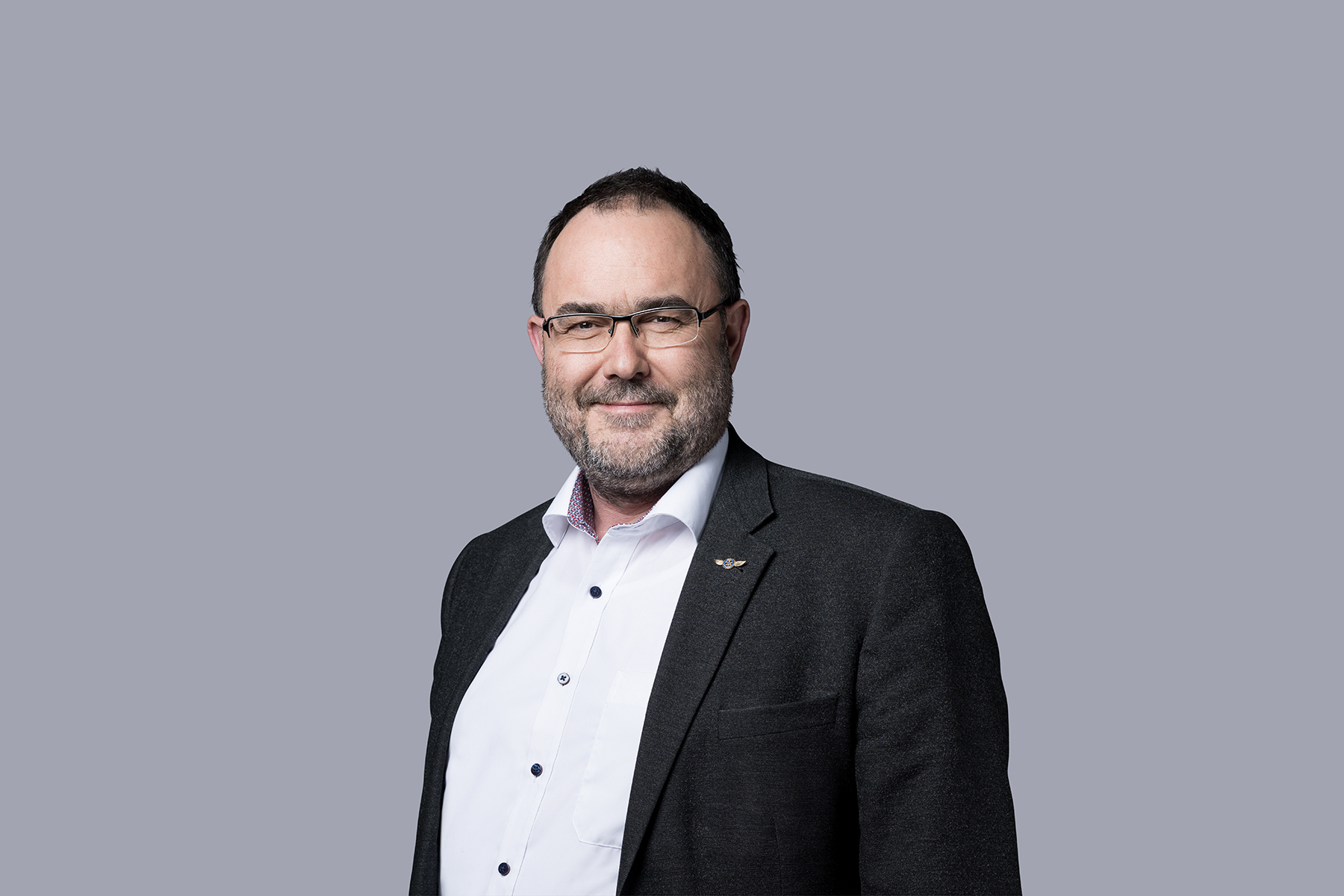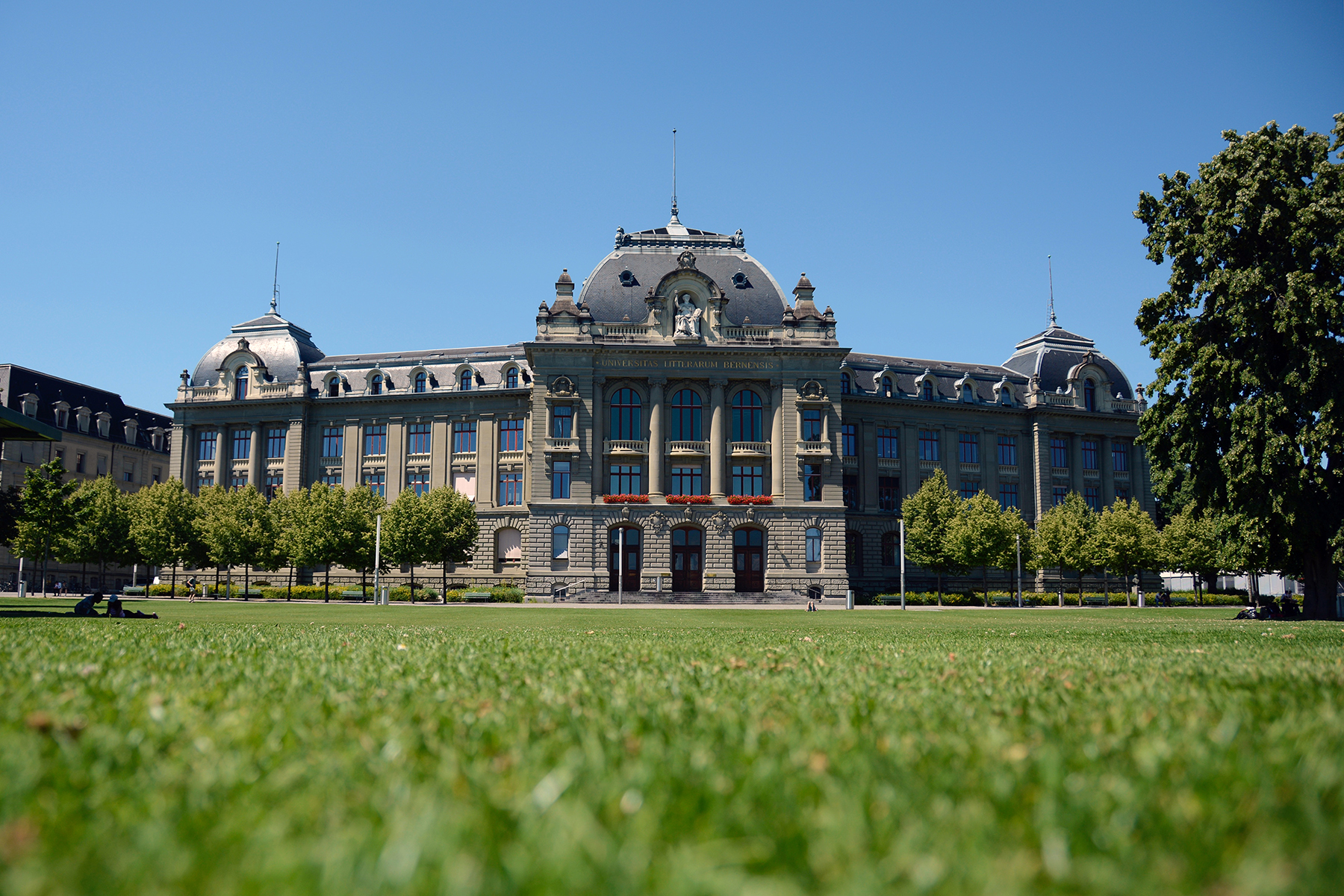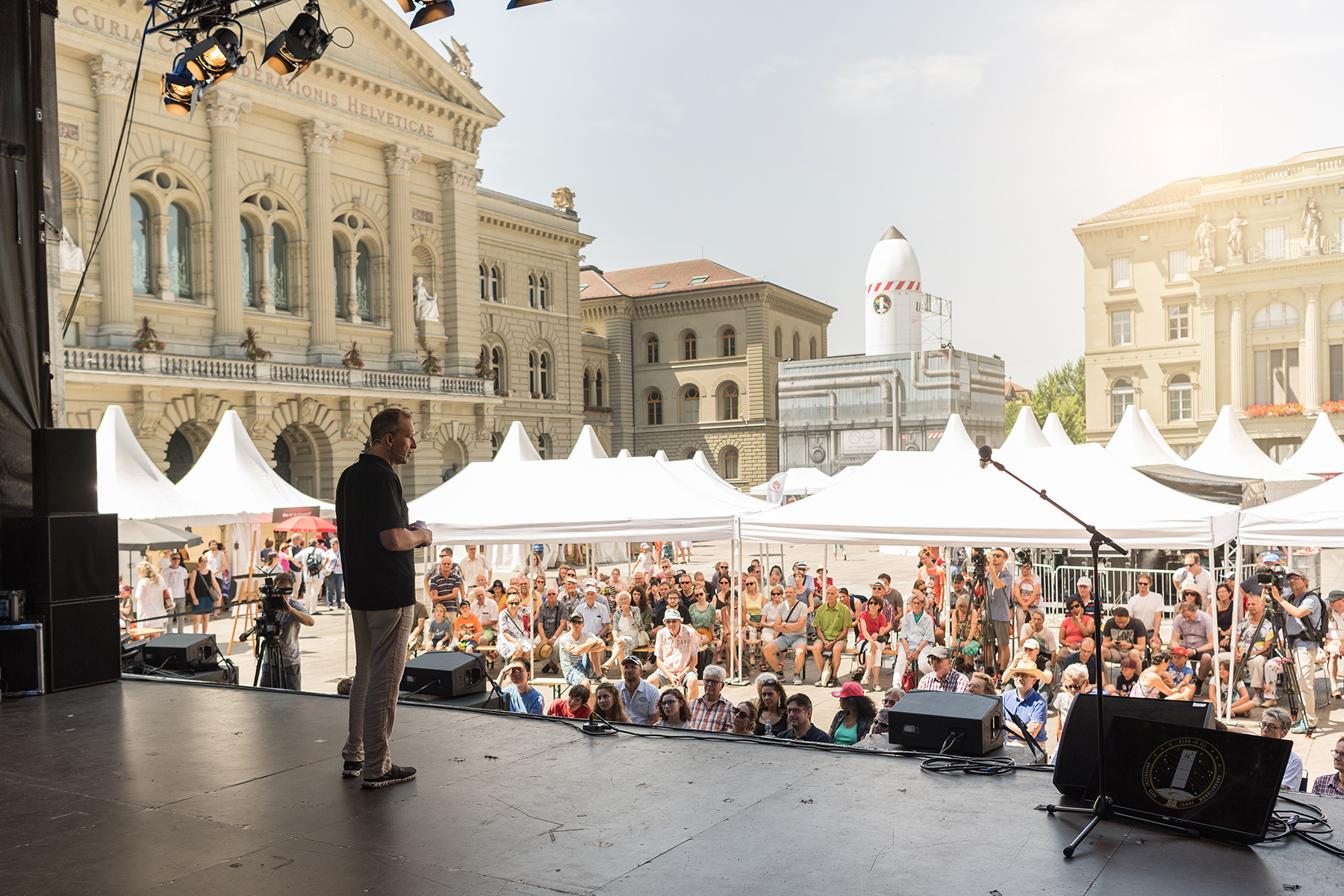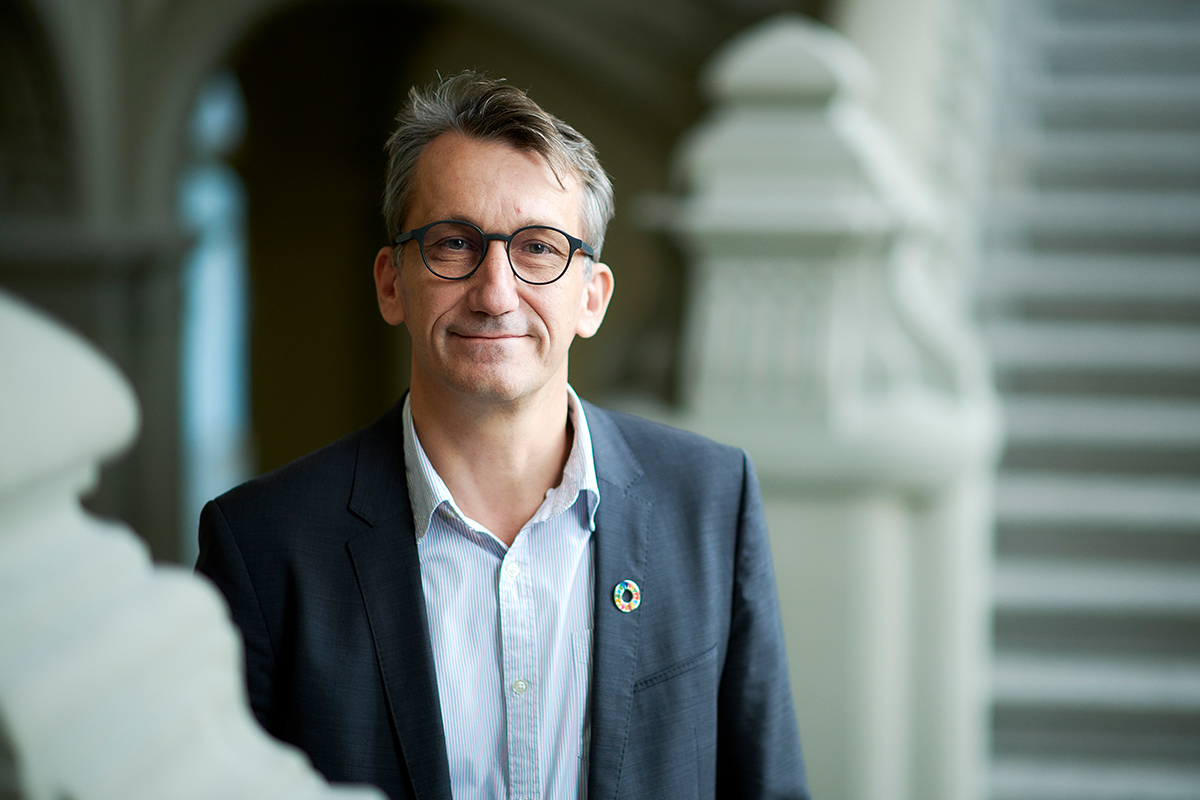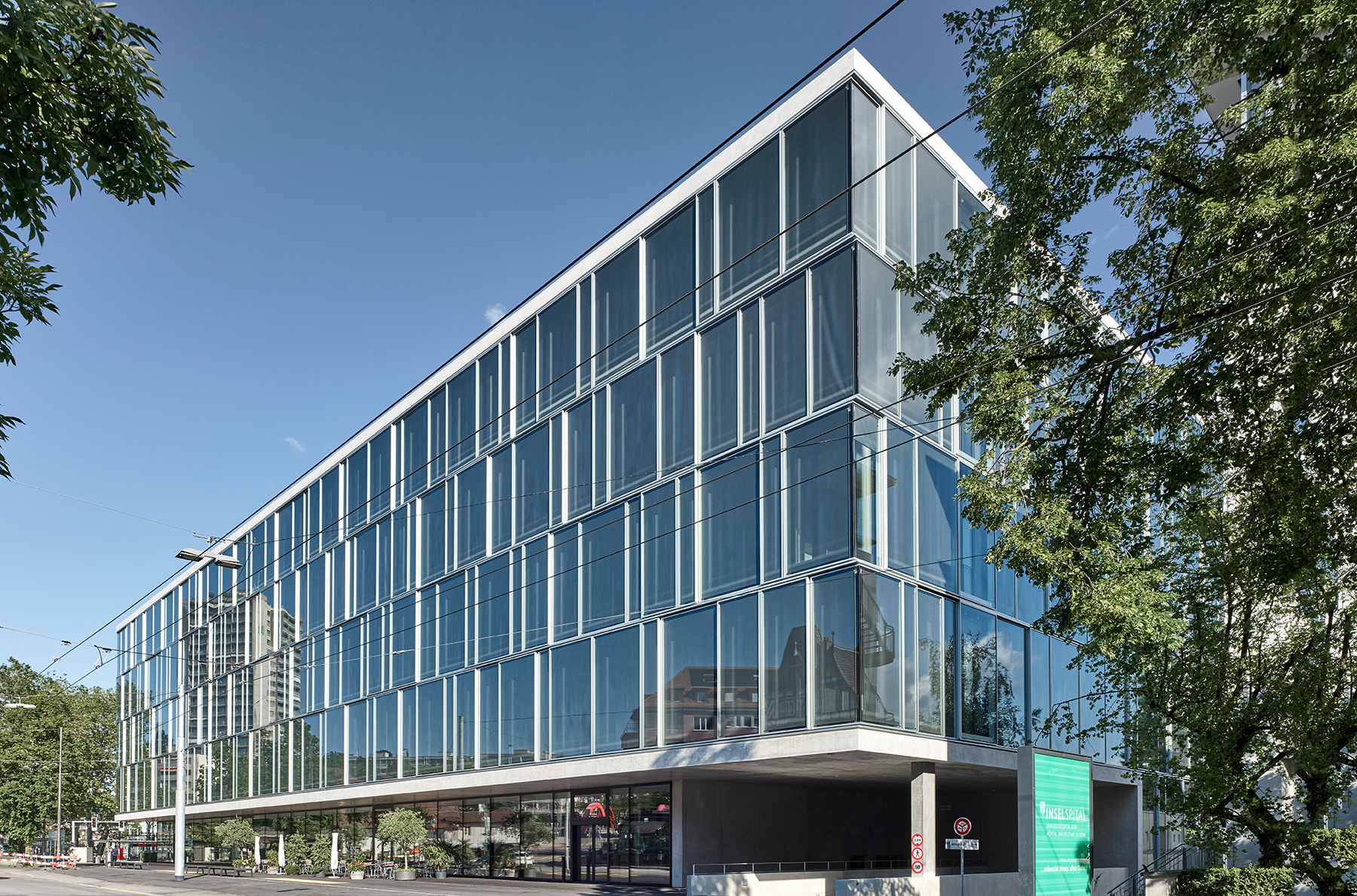The University of Bern strengthens its international presence
The University of Bern excels with its world-class research in several areas: this year, it celebrated the participation in the first moon landing and will soon start an ESA mission into space; the UN’s world sustainability report was drafted under Bernese co-leadership, and its medical research is garnering international recognition at award ceremonies. In addition, the University of Bern has also increased its student numbers.
One of the highlights of the year was the science festival "Bern im All" [Bern in Space], where the University of Bern celebrated the 50th anniversary of the moon landing. NASA’s Apollo 11 mission also saw a piece of Bern land on the moon – the solar wind sail of the University of Bern, which Buzz Aldrin stuck into the ground of the moon, even before the American flag. The science festival for the general public, which took place on the Bundesplatz, among other places, was very well received – and the large space agencies NASA and ESA joined in the celebrations. Bernese space exploration has been world class ever since the moon landing, and the next big mission is about to take off: At the end of 2019, the Bernese space telescope CHEOPS will begin its mission to measure planets outside of our solar system, where it can contribute to the discovery of a planet similar to earth where life may be possible.
Important awards for Bern research
The international success of research conducted at and by the University of Bern is attested by several prestigious awards. These successes include projects from the fields of Geology and Computer Science which received two ERC starting grants from the European Research Council. Moreover, two prestigious grants for medical programs from the US Department of Defense, which are only rarely awarded outside of the USA, went to two Bernese biomedical researchers. "This highlights the unique quality and international importance of research at the University of Bern," says Rector Christian Leumann.
Commitment to Bern as a center for medicine
The University of Bern is the founding member and an academic partner of sitem-insel. The aim of sitem-insel is to translate research findings as quickly as possible into clinical products and services for the benefit of patients. Four institutions of the University of Bern are involved in sitem-insel as so-called "Enabling Facilities" platforms: they support partners from the industry as well as other interested parties with the development of clinical solutions by making their research infrastructure and expertise available. This includes, among other things, spacious laboratories and a workshop. sitem-insel is a joint project of the Federal Government, the Canton of Bern, academia and the private sector and was conceived to contribute to establishing Bern as an internationally leading center for medicine.
Significantly more than 18,000 students
According to the current projections, the overall number of students has increased once more in comparison to the previous year: From 18,019 to around 18,250. "This is largely due to the fact that since last year, 320 places have been made available per year (instead of 220) in human medicine. In addition, the Bachelor program 'Pharmaceutical Studies' is now offered as a full-time course again as of 2019," explains Bruno Moretti, Vice-Rector for Teaching. The University of Bern currently expects around 2,300 new students. 510 people are applying for a Master's degree program for the first time, in addition to those returning to the University of Bern after an interruption or seamlessly advancing from a Bachelor's to Master's degree program. "The new applications show that the Master's courses at the University of Bern continue to be attractive to students from other Swiss universities and abroad," says Moretti. The Faculty of Medicine remains the largest faculty with over 3,000 students, now followed by the Faculty of Science, which was also able to record its highest number of applications this year. To date, applications from 80 countries have been received and the proportion of foreign students in the University of Bern is constant at 13 percent.
Long-term need for space and investment for university buildings
In June, Markus Brönnimann has taken his position as the new Administrative Director at the University of Bern. Before assuming this role, he was the Head of the Real Estate Office at the Canton of Zurich's Building Department as well as Administrative Director at the University of St. Gallen. His main goals include developing and ensuring an ideal infrastructure for teaching and research, to provide effective management and control systems and thus to allow the administration units to perform in an efficient manner.
In the spatial development, incorporating the university units into the sitem-insel building was the most important milestone, followed by the inauguration of the new lecture hall for medical students in the former Alhambra cinema. Due to the rising number of students, however, the university continues to require more space in the long term. On one hand, the university addresses this problem with concentration and expansion, for example, with buildings for the Faculty of Medicine in the Insel site, on the other hand with renovations, such as the Muesmatt building for the Chemistry and Biochemistry Department. "In addition to securing funding, the long duration of such extensive infrastructure projects is also a big challenge," notes Brönnimann. In this way, the long implementation periods lead to provisional arrangements and interim solutions. "Cooperation with cantonal authorities, particularly the Office for Land and Buildings, is excellent," says Brönnimann.
The University of Bern is not only erecting buildings, platforms for strategic initiatives are also created at the university, such as the Bern Center for Precision Medicine (BCPM) which opened in May. Here, various existing strengths of the university are consolidated and research is promoted, which in turn benefits patients.
UN world sustainability report under Bernese co-leadership
In addition to its achievements in space exploration and medical research, the University of Bern is also an international leader when it comes to climate and sustainability research. This week, Peter Messerli, Director of the Centre for Development and Environment (CDE) presented the first world sustainability report in New York, which he played a significant role in designing as co-leader of the international group of experts.
Implementing sustainability in university operations takes place on several levels, among these are recommendations, such as how to manage business trips and meetings as well as conferences in a more sustainable manner. For example, the "Copernicus Alliance" presided over by the University of Bern met this week to discuss the topic of sustainability in higher education with over 90 participants from 30 countries, completely via video conferencing. In teaching, the topic of sustainability is incorporated into and supported by all courses of study, for example with coaching for lecturers and an online tutorial for students.
Strengthening the university’s presence in the EU
The coming EU research program "Horizon Europe" will define the focuses of European research for the years 2021 to 2028. Switzerland is not involved in the current negotiations and the association to the next program is uncertain. In this important phase, the University of Bern is using its network, The Guild, the association of 19 research-intensive higher education universities from 14 European countries to exert coordinated influence on the political decision-makers and EU institutions. At the end of February, Jan Palmowski, General Secretary of The Guild, visited Bern. "Membership in The Guild gives the University of Bern a greater international presence, which ultimately benefits the researchers and students", says Leumann. During his visit, Jan Palmowski emphasized the research excellence of the University of Bern and said that it has made a significant contribution to the position paper of The Guild regarding Horizon Europe. He went on to say that such high-quality contributions are crucial for The Guild to be able to carry out their lobbying work in Brussels for the position of Switzerland.
Better conditions for young academics
The University of Bern stands out as an institution of higher education thanks to their support of young academics in accordance with the 2021 strategy: It wants to simplify an academic career for non-professorial teaching staff and create adequate, internationally competitive terms of employment.
"Together with the faculties and the non-professorial teaching staff, we have been working on improvements to the framework conditions," says Leumann. In this way, the academic career paths should be easier to plan, so as to be able to examine possibilities and prospects at an earlier stage. "The University Ordinance was adjusted in order to implement these new features – the central part of this is the improvement of the terms of employment for young researchers," says Leumann.
A new position has therefore been created: the assistant lectureship with tenure track. This involves an alternative career option for people who wish to specialize in teaching, services or technology applications, for example. Also new is the job category of postdoctoral students, which replaces the previous senior assistants and research associates with dissertation. Changes were made for the doctoral students who are now better supported and for the assistant professors with tenure track. "These measures ensure that young scientists find attractive career paths after their doctoral study in Bern," Leumann is convinced.
2019/09/13



